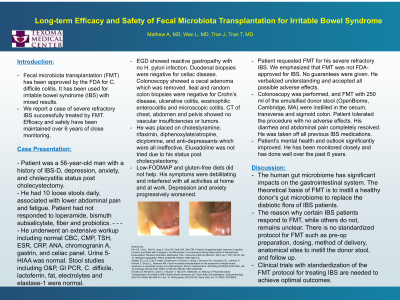Tuesday Poster Session
Category: Functional Bowel Disease
P4081 - Long-Term Efficacy and Safety of Fecal Microbiota Transplantation for Irritable Bowel Syndrome
Tuesday, October 29, 2024
10:30 AM - 4:00 PM ET
Location: Exhibit Hall E

Has Audio

Alfred A. Mathew, MD
TMC
League City, TX
Presenting Author(s)
Award: Presidential Poster Award
Alfred Mathew, MD1, Li Wan, MD1, Jefferson Tran, 2, Thomas Tran, MD1
1TMC, Denison, TX; 2TMC, Sherman, TX
Introduction: Fecal microbiota transplantation (FMT) has been approved by the FDA for C. difficile colitis. It has been used for irritable bowel syndrome (IBS) with mixed results. We report a case of severe refractory IBS successfully treated by FMT. Efficacy and safely have been maintained over 6 years of close monitoring.
Case Description/Methods: Patient was a 56-year-old man with IBS-D, depression, and anxiety. He had 10 loose stools daily and lower abdominal pain. Patient had not responded to loperamide, bismuth subsalicylate, fiber and probiotics. He had normal CBC, CMP, TSH, ESR, CRP, ANA, chromogranin A, gastrin, celiac panel and urine 5-HIAA. Stool studies O&P, GI PCR, C. difficile, lactoferrin, fat, electrolytes and elastase-1 were normal. EGD showed reactive gastropathy with no H. pylori infection. Duodenal biopsies were negative for celiac disease. Colonoscopy with ileal and random colon biopsies were negative for Crohn’s disease, ulcerative colitis, eosinophilic enterocolitis and microscopic colitis. CT of chest, abdomen and pelvis showed no vascular insufficiencies or tumors. He was placed on cholestyramine, rifaximin, diphenoxylate/atropine, dicylomine, and anti-depressants which were ineffective. Eluxadoline was not tried due to his status post cholecystectomy. Low-FODMAP and gluten-free diets did not help. His symptoms were debilitating and interfered with all activities. Depression and anxiety progressively worsened. Patient requested FMT for his severe refractory IBS. We emphasized that FMT was not FDA-approved for IBS. No guarantees were given. He understood and accepted all possible adverse effects. FMT via colonoscopy with 250 ml of the emulsified donor stool (OpenBiome, Cambridge, MA) was performed. Patient tolerated the procedure well. His diarrhea and abdominal pain resolved. Patient’s mental health and outlook significantly improved. He has been monitored closely and has done well over the past 6 years.
Discussion: The human gut microbiome has significant impact on the gastrointestinal system. The theoretical basis of FMT is to instill a healthy donor’s gut microbiome to replace the disbiotic flora of IBS patients. The reason why certain IBS patients respond to FMT, while others do not, remains unclear. There is no standardized protocol for FMT such as pre-op preparation, dosing, method of delivery, anatomical sites to instill the donor stool, and follow up. Clinical trials with standardization of the FMT protocol for treating IBS are needed to achieve optimal outcomes.
Disclosures:
Alfred Mathew, MD1, Li Wan, MD1, Jefferson Tran, 2, Thomas Tran, MD1. P4081 - Long-Term Efficacy and Safety of Fecal Microbiota Transplantation for Irritable Bowel Syndrome, ACG 2024 Annual Scientific Meeting Abstracts. Philadelphia, PA: American College of Gastroenterology.
Alfred Mathew, MD1, Li Wan, MD1, Jefferson Tran, 2, Thomas Tran, MD1
1TMC, Denison, TX; 2TMC, Sherman, TX
Introduction: Fecal microbiota transplantation (FMT) has been approved by the FDA for C. difficile colitis. It has been used for irritable bowel syndrome (IBS) with mixed results. We report a case of severe refractory IBS successfully treated by FMT. Efficacy and safely have been maintained over 6 years of close monitoring.
Case Description/Methods: Patient was a 56-year-old man with IBS-D, depression, and anxiety. He had 10 loose stools daily and lower abdominal pain. Patient had not responded to loperamide, bismuth subsalicylate, fiber and probiotics. He had normal CBC, CMP, TSH, ESR, CRP, ANA, chromogranin A, gastrin, celiac panel and urine 5-HIAA. Stool studies O&P, GI PCR, C. difficile, lactoferrin, fat, electrolytes and elastase-1 were normal. EGD showed reactive gastropathy with no H. pylori infection. Duodenal biopsies were negative for celiac disease. Colonoscopy with ileal and random colon biopsies were negative for Crohn’s disease, ulcerative colitis, eosinophilic enterocolitis and microscopic colitis. CT of chest, abdomen and pelvis showed no vascular insufficiencies or tumors. He was placed on cholestyramine, rifaximin, diphenoxylate/atropine, dicylomine, and anti-depressants which were ineffective. Eluxadoline was not tried due to his status post cholecystectomy. Low-FODMAP and gluten-free diets did not help. His symptoms were debilitating and interfered with all activities. Depression and anxiety progressively worsened. Patient requested FMT for his severe refractory IBS. We emphasized that FMT was not FDA-approved for IBS. No guarantees were given. He understood and accepted all possible adverse effects. FMT via colonoscopy with 250 ml of the emulsified donor stool (OpenBiome, Cambridge, MA) was performed. Patient tolerated the procedure well. His diarrhea and abdominal pain resolved. Patient’s mental health and outlook significantly improved. He has been monitored closely and has done well over the past 6 years.
Discussion: The human gut microbiome has significant impact on the gastrointestinal system. The theoretical basis of FMT is to instill a healthy donor’s gut microbiome to replace the disbiotic flora of IBS patients. The reason why certain IBS patients respond to FMT, while others do not, remains unclear. There is no standardized protocol for FMT such as pre-op preparation, dosing, method of delivery, anatomical sites to instill the donor stool, and follow up. Clinical trials with standardization of the FMT protocol for treating IBS are needed to achieve optimal outcomes.
Disclosures:
Alfred Mathew indicated no relevant financial relationships.
Li Wan indicated no relevant financial relationships.
Jefferson Tran indicated no relevant financial relationships.
Thomas Tran indicated no relevant financial relationships.
Alfred Mathew, MD1, Li Wan, MD1, Jefferson Tran, 2, Thomas Tran, MD1. P4081 - Long-Term Efficacy and Safety of Fecal Microbiota Transplantation for Irritable Bowel Syndrome, ACG 2024 Annual Scientific Meeting Abstracts. Philadelphia, PA: American College of Gastroenterology.

